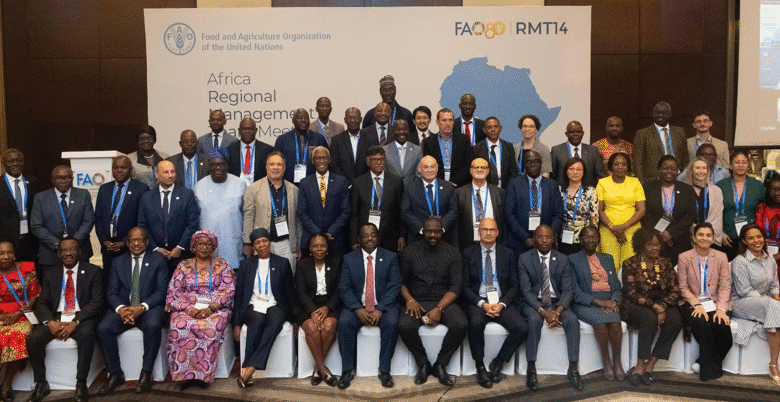
Ghana has reaffirmed its commitment to leading efforts toward a resilient and inclusive agricultural future for Africa, as the Food and Agriculture Organization (FAO) of the United Nations opened its 14th Regional Management Team (RMT14) meeting in Accra.
The three-day meeting, being held under the theme Partnership. Innovation. Action. Learning, has brought together more than 150 leaders and technical specialists from across Africa and FAO headquarters. The sessions are focusing on ways to strengthen partnerships, drive innovation, scale up action, and enhance learning across Africa’s agrifood systems in line with FAO’s Strategic Framework 2022–2031.
Speaking at the opening ceremony, Ghana’s Deputy Minister for Food and Agriculture, John Dumelo, emphasized Ghana’s readiness to play a leadership role in the continent’s agricultural transformation.
“Ghana is honoured to serve as the host of the FAO Regional Office for Africa in our dynamic capital, Accra — a testament to the deep and enduring partnership between Ghana and FAO,” Mr. Dumelo stated. “Ghana is ready to walk side by side with FAO and all partners. Ready to lead and to learn. Ready to drive the transformation that will secure a resilient, inclusive, and prosperous agricultural future for our nation and for Africa.”
Mr. Dumelo’s remarks captured the urgency of the moment as Africa faces mounting food security challenges, the impacts of climate change, and economic pressures. He stressed that transforming Africa’s agriculture is not only vital for food security but also for economic growth, youth employment, and environmental sustainability.
Building on Eight Decades of Action
The RMT14 meeting comes during FAO’s 80th anniversary year, marking eight decades of global efforts to end hunger and improve agrifood systems. Reflecting on this milestone, FAO Deputy Director-General Maurizio Martina noted that the organization’s work is far from over, especially as Africa contends with deepening crises.
“Partnership, innovation, action, learning – these are deeply connected concepts. As we mark 80 years of FAO, this event enhances our efforts to tackle food security and nutrition challenges globally,” he said.
FAO Assistant Director-General and Regional Representative for Africa, Abebe Haile-Gabriel, called on participants to reject “business as usual” and to actively pursue and scale up innovative solutions — from technology to financial models and policy frameworks. He noted the significant progress made across the continent, citing strengthened partnerships, increased resource mobilization, and the expansion of FAO initiatives like the Hand-in-Hand Initiative, now active in 37 African countries.
Charting a New Path for Agrifood Systems
Over the next three days, participants will deliberate on a range of critical issues including reviewing progress under FAO’s Strategic Framework, mobilizing resources for sustainable agrifood transformation, and scaling up innovations to boost food security and climate resilience. Special focus will be given to aligning FAO’s work with Africa’s newly adopted Post-Malabo CAADP 2026–2035 Strategy and advancing youth and women’s empowerment in agriculture.
A special exhibition titled “FAO at 80: 365 Days of Action in Africa” is also running alongside the meeting, showcasing FAO’s achievements in Africa over the decades and highlighting future priorities.
Representatives from the African Union, FAO Subregional Coordinators, development partners, and technical experts are participating, underscoring the collaborative spirit needed to drive Africa’s agricultural transformation.




